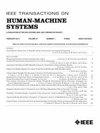人-机器人团队信任的博弈论模型:指导人类监控机器人行为的观察策略
IF 4.4
3区 计算机科学
Q2 COMPUTER SCIENCE, ARTIFICIAL INTELLIGENCE
引用次数: 0
摘要
在涉及机器人生成和执行计划的场景中,成本效益高的机器人执行和满足人类对安全行为的期望之间可能会出现冲突。当人类监督机器人时,他们的责任就会增加,尤其是当机器人的行为偏离预期时。为了解决这个问题,机器人可能会在被监视时选择一个高度受限的计划,而在不被监视时选择一个更优的计划。虽然这种行为不是由类似人类的动机驱动的,但它源于机器人适应不同的主管。为了在确保安全的同时优化监测成本,我们在基于信任的博弈论框架中对这种相互作用进行了建模。然而,在该模型中往往不存在纯策略纳什均衡。为了解决这个问题,我们在混合策略空间中引入了信任边界的概念,以帮助发现最佳监控策略。人体研究证明了最佳策略的必要性和我们建议的方法的好处。本文章由计算机程序翻译,如有差异,请以英文原文为准。
A Game-Theoretic Model of Trust in Human–Robot Teaming: Guiding Human Observation Strategy for Monitoring Robot Behavior
In scenarios involving robots generating and executing plans, conflicts can arise between cost-effective robot execution and meeting human expectations for safe behavior. When humans supervise robots, their accountability increases, especially when robot behavior deviates from expectations. To address this, robots may choose a highly constrained plan when monitored and a more optimal one when unobserved. While this behavior is not driven by human-like motives, it stems from robots accommodating diverse supervisors. To optimize monitoring costs while ensuring safety, we model this interaction in a trust-based game-theoretic framework. However, pure-strategy Nash equilibrium often fails to exist in this model. To address this, we introduce the concept of a trust boundary within the mixed strategy space, aiding in the discovery of optimal monitoring strategies. Human studies demonstrate the necessity of optimal strategies and the benefits of our suggested approaches.
求助全文
通过发布文献求助,成功后即可免费获取论文全文。
去求助
来源期刊

IEEE Transactions on Human-Machine Systems
COMPUTER SCIENCE, ARTIFICIAL INTELLIGENCE-COMPUTER SCIENCE, CYBERNETICS
CiteScore
7.10
自引率
11.10%
发文量
136
期刊介绍:
The scope of the IEEE Transactions on Human-Machine Systems includes the fields of human machine systems. It covers human systems and human organizational interactions including cognitive ergonomics, system test and evaluation, and human information processing concerns in systems and organizations.
 求助内容:
求助内容: 应助结果提醒方式:
应助结果提醒方式:


